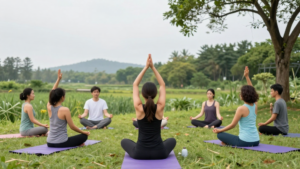Exciting Hobbies to Discover This Year

Embarking on the journey of discovering new hobbies can be life-changing. Hobbies are not just pastimes; they play a crucial role in personal growth and well-being. Engaging in various activities enhances mental health, fosters social connections, and encourages self-discovery. Engaging in hobbies significantly contributes to personal development and well-being.
“Engaging in hobbies significantly contributes to personal development and well-being.”
Exploring new interests can lead to improved skills, increased happiness, and a healthier work-life balance. So why not take the plunge and find a hobby that resonates with you?
Gardening for Relaxation
Gardening is more than just a hobby; it’s a therapeutic escape that offers significant mental health benefits. Engaging in gardening can improve mood by fostering feelings of peace and contentment, reducing stress and negative thoughts. Additionally, nurturing plants boosts self-esteem and encourages social connections through community gardening.
For those new to gardening, starting with easy-to-grow plants can make the experience enjoyable and rewarding. Here are some beginner-friendly options:
Salad Greens: A mix of lettuce, spinach, and kale that can be sown in spring and fall for continuous harvest.
Cherry Tomatoes: Juicy and flavorful, these thrive in containers and are easier to grow than larger varieties.
Basil: An aromatic herb that’s forgiving, perfect for containers or garden beds.
Daffodils: Cold-hardy perennials that bloom beautifully in spring.
Strawberries: Sweet and rewarding, perfect for hanging baskets.
With the right plants, gardening can become a fulfilling journey, promoting mental well-being while connecting with nature.
Photography as a Creative Outlet
Photography is a wonderful way to express your creativity while developing a new skill. Whether you are capturing stunning landscapes or candid moments, photography encourages you to engage with your environment and see the world through a unique lens. Here are some basic tips for beginners to get started:
Work with your composition; think about balance and simplicity.
Use the camera you already have; focus on improving your skills.
Learn key settings like aperture, shutter speed, and ISO.
Be mindful of lighting to enhance your images.
Take your time and review your work to learn and grow.
Moreover, photography is not just about technique; it is a profound creative process. It invites you to explore deeper meanings and connect with your surroundings on a personal level. This artistic journey can lead to greater self-expression and reflection.
| Camera Type | Pros | Cons |
|---|---|---|
| Smartphone | Convenient, easy to use, great for social sharing | Limited manual controls, smaller sensor size |
| Point-and-Shoot | Compact, user-friendly, good image quality | Less flexible, limited features |
| DSLR | Interchangeable lenses, excellent image quality, manual controls | Bulky, steeper learning curve |
| Mirrorless | Compact, interchangeable lenses, advanced features | Battery life can be shorter, lens options may be limited |
By embracing photography, you can unlock your creativity and capture moments that resonate with your spirit. So grab your camera and start exploring!
Chess for Strategic Thinking
Chess is more than just a game; it’s a powerful tool for enhancing cognitive skills. Engaging in chess can improve memory, creativity, and planning abilities. Studies have shown that regular players excel in tasks requiring perspective-taking and problem-solving, making chess a unique way to bolster mental agility.
One remarkable benefit is the ability to enter a ‘flow state.’ This state allows players to experience heightened focus and peak performance during matches. Furthermore, chess has therapeutic advantages, such as aiding in the management of ADHD symptoms and promoting emotional regulation.
If you’re interested in diving into the world of chess, there are numerous resources available:
Chess.com – Offers tutorials and practice games.
Lichess.org – A free platform with various learning tools.
Books like ‘Bobby Fischer Teaches Chess’ or ‘Chess for Dummies’ are excellent for beginners.
Online courses on platforms like Udemy or Coursera can provide structured learning.
By embracing chess, you can sharpen your mind while enjoying a strategic and rewarding hobby.
Running for Health and Fitness
Running is an excellent hobby that offers numerous physical and mental benefits. Just 50 minutes of running each week can significantly lower the risk of heart disease and enhance overall physical health. Furthermore, running can help reduce stress by triggering the release of endocannabinoids, leading to a greater sense of calm and improved mood.
Additionally, regular running can alleviate symptoms of anxiety and depression. Studies indicate that its effects may be comparable to those of some medications. Not only does running contribute to mental well-being, but it also fosters better sleep patterns, which are crucial for mental health.
For those new to running, here are some tips to help you get started:
Aim to run for at least 30 minutes, three to five times a week.
Start small and focus on consistency.
Find a running partner for motivation and accountability.
Be mindful of your body and adjust your routine as needed.
Incorporate warm-ups and consider cross-training to prevent injuries.
Always allow your body time to rest and recover.
Embracing running as a hobby can lead to lasting health benefits and a deeper connection to your physical and mental well-being.
Journaling for Reflection
Journaling is a powerful hobby that promotes personal reflection and mental well-being. It helps enhance self-awareness by allowing individuals to explore their thoughts and emotions deeply. This practice can serve as a safe space for emotional processing, reducing stress and fostering a sense of clarity.
Additionally, journaling encourages goal setting and tracking, which cultivates motivation and a sense of accomplishment. It can also enhance memory retention and stimulate creativity, making it a versatile tool for personal growth.
There are various journaling techniques to cater to different preferences:
Free Writing
Morning Pages
Gratitude Journal
Bullet Journaling
Dream Journaling
To get started, consider these journaling prompts:
What am I grateful for today?
How did I feel today and why?
What challenges did I face this week?
What are my goals for the upcoming month?
Embrace journaling as a hobby to unlock new insights and foster personal development.
Pottery for Hands-On Creativity
Pottery is a captivating hobby that allows for hands-on creativity. Working with clay can be incredibly therapeutic. It engages the senses and encourages mindfulness, helping to relieve stress and promote relaxation. As you mold and shape the clay, you may find a sense of calm and focus that is hard to achieve in our fast-paced lives.
Getting started with pottery is easier than you might think. Many local studios offer beginner classes, providing all the necessary materials and guidance. Here are some resources to help you embark on your pottery journey:
Ceramic Arts Network – Offers tutorials and resources for beginners.
National Endowment for the Arts – Find local workshops and classes.
YouTube – A wealth of free videos on pottery techniques.
Whether you’re creating functional pieces or artistic expressions, pottery can be a fulfilling and enjoyable hobby that nurtures your creative spirit.
FAQ on Choosing a Hobby
Q: What if I don’t have enough time to start a new hobby? A: Many people feel overwhelmed by their busy schedules. Start small by dedicating just 15-30 minutes a week to your hobby. This way, you can gradually increase your commitment as you become more comfortable.
Q: I’m worried I won’t be good at it. A: Remember, the goal of a hobby is enjoyment and personal growth, not perfection. Embrace the learning process! Journaling about your experiences can help you reflect on your progress and appreciate your journey.
Q: How do I choose the right hobby for me? A: Think about your interests and passions. Consider trying a few different activities to see what resonates. It’s okay to experiment! You may discover a passion you never expected.
Q: What if I feel discouraged? A: It’s normal to face challenges when starting something new. If you feel stuck, journaling can help clear your mind. Write down your thoughts and feelings, and seek support from friends or local communities.
https://blissfullway.com/8-simple-habits-for-a-more-stress-free-life/
Conclusion and Encouragement
Exploring new hobbies can lead to enhanced self-awareness, creativity, and emotional well-being. Each activity offers a chance to grow personally and connect with others who share similar interests. Remember, the journey of discovering your passion is as important as the destination.
“The first step is the hardest, but it leads to incredible discoveries.” Don’t hesitate to take that leap! Embrace the excitement of trying something new and watch how it enriches your life. For more insights on the benefits of journaling, check out this article and explore various journaling techniques that can inspire your journey.








